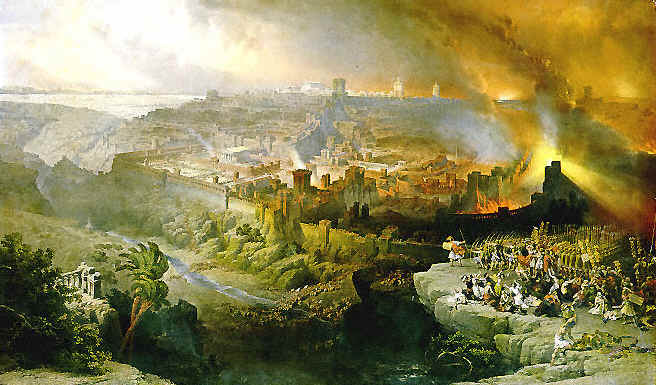
 |
Isaac Newton | Protestant History | 3 Interpretations | Daniel | Revelation | Armageddon | Audio Links | Site Index |
| Home ¬ Previous Page ¬ Mathew 24, Future or Fulfilled? | ||||||||


Those of the Futurist interpretation apply the verses about deceivers, wars, and pestilence to our time, as things leading up to the tribulation period which they believe will be the last seven years of this age. The abomination of desolation is regarded as an idol of the antichrist (or the Antichrist himself) to be set up in the holy of holies of a rebuilt temple at Jerusalem. When this happens, according to this position, the Jews will flee into the mountains, for then shall be the great tribulation.
The Fulfilled interpretation, on the other hand, holds that the deceivers, wars, and pestilence were things which Jesus said would happen, things that happened before the destruction of the temple. The abomination of desolation, by comparing the parallel accounts, was the Gentile armies that surrounded Jerusalem to cause its desolation. Upon heeding the warning of Jesus, the disciples fled Jerusalem and Judea. What Jesus called the "Great Tribulation" referred to the judgment that fell upon the Jewish nation, resulting in the destruction of Jerusalem and the temple in 70AD
Obviously the two interpretations the Futurist and Fulfilled, are far apart. Doubtless, there are fine Christians on both sides. But we feel many have accepted the futurist view, only because they have not been fully aware of the historical fulfillment. The prophecy is recorded in Matthew 24, Mark 13, and Luke 21. In order to get the full picture, the careful student will read all three accounts. Sometimes a detail not fully explained in one, is explained in another. *
There have been many writers through the centuries that have believed and taught the Fulfilled Interpretation. We have provided a sampling of them for your study.
*From "Great Prophecies of the Bible" by Ralph Woodrow
P.O. Box 21, Palm Springs, CA 92263. His website is
http://www.ralphwoodrow.org/
His phone # is 760-327-6049
Clement of Alexandria (A.D.150-215)
Irenaeus (Approx. AD 174)
Cyprian (approx. AD 250)
6. That the Jews should lose Jerusalem, and should leave the land which they had received. In Isaiah: "Your country is desolate, your cities are burned with fire: your land, strangers shall devour it in your sight; and the daughter of Zion shall be left deserted, and overthrown by foreign peoples, as a cottage in a vineyard, and as a keeper's lodge in a garden of cucumbers, as a city which is besieged.
And unless the Lord of Sabaoth had left us a seed, we should have been as Sodoma, and we should have been like unto Gomorrah."[5] Also in the Gospel the Lord says: "Jerusalem, Jerusalem, that killest the prophets, and stonest them that are sent unto thee, how often would I have gathered thy children as a hen gathereth her chickens under her wings, and thou wouldst not! Behold, your house shall be left unto you desolate."[6] (THREE BOOKS OF TESTIMONIES AGAINST THE JEWS., 6)
Origen (2nd Century)
Tertullian (Approx. AD 200)
Hippolytus of Rome (II/III Centuries)
Lactantius (3rd Century)
Eusebius (325)
Chrysostom, (John of Antioch) (347-407)
Athanasius (345)
Jonathan Edwards (1736)
On the Significance of A.D.70 "Thus there was a final end to the Old Testament world: all was finished with a kind of day of judgment, in which the people of God were saved, and His enemies terribly destroyed." (The History of Redemption vol. i. p. 445)
Thomas Newton (1754)
John Wesley (1754)
John Gill (1809)
Adam Clarke(1837)
John Lightfoot (1859)
C.H. Spurgeon (1868)
Philip Schaff (1877)
"Yet the predicted judgment did not immediately follow; for Christ prayed for His murderers in His dying hour, "Father, forgive them; for they know not what they do" (Lu. 23:34). In answer to that prayer the full probationary period of forty years (A.D. 30 to A.D. 70) was added to their national existence, during which time repentance and remission of sins was preached to them in the Name of the crucified and risen One, and tens of thousands of Jews were saved. " (Seventy Weeks, ch. 5)
Milton Terry (1898)
Philip Mauro (1921)